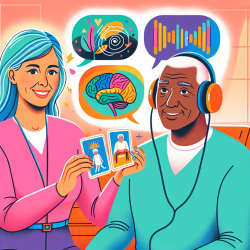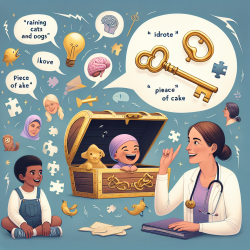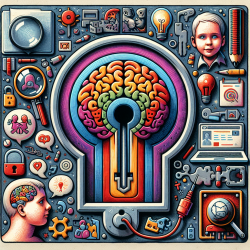Alzheimer's disease (AD) presents multifaceted challenges to healthcare professionals, particularly in maintaining and enhancing communicative functions. A pivotal aspect of addressing these challenges lies in understanding the nuanced ways cognitive decline affects language and comprehension. The research conducted by Bayles, Caffrey, Tomoeda, and Trosset provides invaluable insights into the realms of confrontation naming and auditory comprehension in AD patients, offering a beacon for practitioners aiming to refine their therapeutic strategies.
Confrontation naming, the ability to name objects or pictures presented by an examiner, often deteriorates in Alzheimer's patients. This decline is not merely a symptom of AD but a window into the broader cognitive impairments that characterize the disease. The study reveals that object presentation facilitated confrontation naming 27% of the time in mild AD patients and 15.9% in moderate AD patients who were unable to name objects from pictures. Interestingly, unnamed pictures and objects were significantly likely to be identified in an auditory comprehension task, suggesting that confrontation anomia in AD does not primarily stem from a loss of the object's name from the mental lexicon or perceptual dysfunction.
This dissociation between the ability to name objects and to comprehend auditory information underscores the complexity of cognitive processes affected by Alzheimer's. It hints at a progressive deterioration of semantic memory, where the conceptual knowledge of objects becomes fragmented. However, the capacity for auditory comprehension remains relatively preserved, indicating that different facets of memory and language are impacted to varying degrees.
For practitioners, these findings illuminate several pathways to enhance therapy for AD patients:
- Emphasize Multisensory Stimulation: Given that real object presentation can modestly improve naming abilities, integrating tactile and visual stimuli into therapy sessions could bolster language recall and comprehension.
- Focus on Auditory Comprehension: Leveraging the relative preservation of auditory comprehension can aid in maintaining communication with AD patients. Activities that match spoken words to objects or pictures might reinforce connections between objects and their names.
- Personalize Therapy Approaches: The variability in response to object presentation among AD patients suggests the need for personalized therapy strategies that consider the individual's stage of dementia and specific cognitive capabilities.
- Encourage Family Involvement: Educating families on the benefits of engaging AD patients in naming and comprehension activities at home can extend the therapeutic effects and provide a supportive environment for communication.
The study's insights do not merely offer strategies for mitigating the symptoms of cognitive decline but also underscore the importance of approaching Alzheimer's therapy with a nuanced understanding of its impact on language and comprehension. By integrating these findings into therapeutic practices, clinicians can better support AD patients in maintaining communication skills and quality of life.
Furthermore, the research encourages practitioners to delve deeper into the mechanisms underlying cognitive impairments in AD. It opens avenues for further investigation into how therapies can be tailored to address the specific neural and cognitive changes associated with different stages of the disease.
In conclusion, the study by Bayles et al. serves as a critical reminder of the need for evidence-based approaches in the treatment of Alzheimer's disease. By focusing on the strengths and weaknesses in patients' cognitive functioning, practitioners can develop more effective, personalized, and compassionate care strategies. As we continue to unravel the complexities of Alzheimer's, studies like this provide a foundation for hopeful advancements in therapy and patient care.
To read the original research paper, please follow this link: Confrontation Naming and Auditory Comprehension in Alzheimer's Patients.










